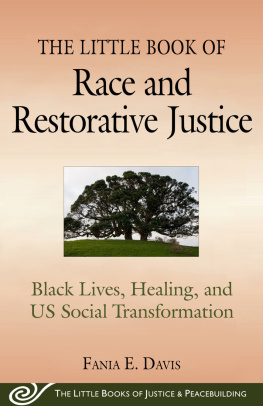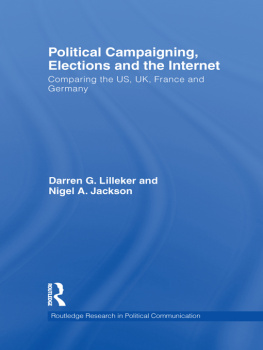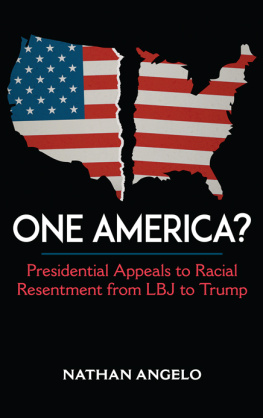Racial Resentment in the Political Mind
Racial Resentment in the Political Mind
DARREN W. DAVIS AND DAVID C. WILSON
The University of Chicago Press
CHICAGO & LONDON
The University of Chicago Press, Chicago 60637
The University of Chicago Press, Ltd., London
2022 by The University of Chicago
All rights reserved. No part of this book may be used or reproduced in any manner whatsoever without written permission, except in the case of brief quotations in critical articles and reviews. For more information, contact the University of Chicago Press, 1427 E. 60th St., Chicago, IL 60637.
Published 2022
Printed in the United States of America
31 30 29 28 27 26 25 24 23 22 1 2 3 4 5
ISBN -13: 978-0-226-81467-4 (cloth)
ISBN -13: 978-0-226-81484-1 (paper)
ISBN -13: 978-0-226-81470-4 (e-book)
DOI : https://doi.org/10.7208/chicago/9780226814704.001.0001
Library of Congress Cataloging-in-Publication Data
Names: Davis, Darren W., author. | Wilson, David C. (David Christopher), author.
Title: Racial resentment in the political mind / Darren W. Davis and David C. Wilson.
Description: Chicago : University of Chicago Press, 2022. | Includes bibliographical references and index.
Identifiers: LCCN 2021021096 | ISBN 9780226814674 (cloth) | ISBN 9780226814841 (paperback) | ISBN 9780226814704 (ebook)
Subjects: LCSH : Race awarenessUnited States. | WhitesUnited StatesAttitudes. | African AmericansAttitudes. | ResentmentSocial aspectsUnited States. | United StatesRace relations.
Classification: LCC E 185.615 . D 3857 2022 | DDC 305.800973dc23
LC record available at https://lccn.loc.gov/2021021096

This paper meets the requirements of ANSI/NISO Z 39.48-1992 (Permanence of Paper).
Contents
As reported in the major headlines and bolstered by public opinion data, there is a growing sentiment among Whites that they are losing ground, being left behind and overlooked, and cut in line by undeserving racial and ethnic minorities. Increasingly, Whites perceive that the American way of life is changing in such a way that their privilege and status are being threatened, and African Americans and other minorities are benefiting unfairly by circumventing generally accepted rules of the game and eschewing traditional values. Such sentiments are not exclusively grounded in racial prejudice, hate, or anti-Black affect; rather, Whites sense of threat is connected to beliefs about justice, fairness, and legitimizing racial myths. Many refer to this growing sentiment as racial resentment, which we believe is the correct terminology but based on the wrong reasoning. Racial resentment and its measurement were introduced over 30 years ago, becoming the most identifiable and available indicator of racial prejudice. It is extremely limited as an analytical framework and incapable of explaining politics and political appeals today because it rests on the notion that racial prejudice is the main ingredient driving political and social attitudes when what is really happening involves a reaction to the loss of status and privilege. Nevertheless, racial resentment, properly conceived and measured, offers the most valid analytical framework for understanding such perceptions.
We argue that racial resentment may also stem from a justice motive, in which people have an expectation for and belief in an orderly and just world where people get what they deserve and deserve what they get. A sense of uncertainty, discomfort, and dissonance occurs when positive outcomes are perceived to be awarded randomly, or when people are perceived to be rewarded or advantaged when they have ostensibly not met the criteria for deservingness. Racial stereotypes, prejudice, and other information facilitate an appraisal of deservingness concerning what relief African Americans and other minorities receive. While racial resentment may be influenced by both racial and non-racial information, it is not itself wholly prejudice; instead, resentment is conceivably an outgrowth of this process when African Americans and other minorities are perceived to be rewarded undeservingly, threatening broader systems of merit. And because this process begins with a justice motive or expectation of fairness, the sense of justice in the racially resentful person needs to be restored. Until it is restored (if it ever can be), racial resentment festerscreating a desire for retribution in order to restore a belief in a just world. Retribution takes the form of psychological desires like schadenfreude and political preference like opposition to ameliorative policies. In a nutshell, people can develop beliefs about race that are only partially, if at all, based on racial prejudice or antipathy. Racial resentment may stem from broader non-racial motives applied to racial groups when considering politics.
Whites perceive that African Americans are seeking to use different means to benefit more than everyone else when there is no evidence they have specifically been harmed by racism or slavery, and expect Whites to remain silent when they have legitimate questions about racial issues. Such racial information and beliefs become important aspects of how Whites appraise African Americans deservingness. And so, decisions may be racial because they involve an implicit or explicit reference to African Americans and other minorities without necessarily being racist.
Although the classic racial resentment measure has been broadly accepted and legitimized in political behavior and public opinion research (i.e., codified in the American National Election Studies [ANES] since 1986 and replicated in numerous surveys), there have been questions related to whether it measures what it purports to measure. Researchers may be surprised to learn that the technical concept of racial resentment began as a renaming of symbolic racism, which at that time was embroiled in its own measurement controversy. Using the same survey measures and theory as symbolic racism, classic racial resentment was simply a new name for an existing idea; the new label was intended to capture both Black affect (or racial prejudice) and perceptions of Blacks violating traditional norms. Without any other available measures of racial prejudice, classic racial resentment became accepted as a measure of racial prejudice. Perhaps due to its grounding in symbolic racism, its explicit connection of policy attitudes and race, and its being located on the canonical survey of political attitudes (i.e., the ANES), classic racial resentment became the go-to measure of racial prejudice in political science and other disciplines. While there were carry-over controversies from debates related to symbolic racismwhich was simultaneously being developed by other researchersthe classic racial resentment concept and measurement were privileged without much debate. In fact, it took almost 30 years for classic racial resentment to undergo a rigorous validation, though those same items under the umbrella of symbolic racism were seriously scrutinized as ideological. Make no mistake, the rebranding of racial resentment was broadly accepted by researchers and proved to be a quite powerful predictor of political attitudes and behavior. Our assessment is that because of deep racial polarization in the American public, classic racial resentment captures something correlated with anti-Black affect, as do nearly all measures of racial attitudesand some measures of non-racial attitudes (e.g., social dominance, conservatism, and authoritarianism)but that the measure captures neither racial resentment nor racial prejudice.


 This paper meets the requirements of ANSI/NISO Z 39.48-1992 (Permanence of Paper).
This paper meets the requirements of ANSI/NISO Z 39.48-1992 (Permanence of Paper).









